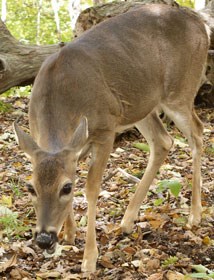
NPS photo. Are you interested in being out in the field with bears, bats, elk, and wild hogs? If you like spending your days tracking wildlife and thinking about population dynamics, animal safety, and even some human management in the National Parks, here are some suggestions about how to get there: In high school: Take biology, chemistry, earth science, geography, and math courses geared for college-bound students, because these will prepare you best for challenging college courses. Ask parks if they have high school summer internships, as the Great Smoky Mountains National Park does. In college and/or graduate school: It's essential to know the difference between studying wildlife, either a species or relationships between populations, and managing wildlife. Managing wildlife can include the tough jobs of trapping, relocating, and euthanizing human-conditioned animals, and hunting invasive animals. It also means making decisions based on long-term goals for wildlife populations in your specific park. That said, if you love biology, ecology, geography, forestry, look for research, jobs, or internships (see below for more on this) to gain more classroom and field experience. Some internships at the high school level allow you to gain experience in the wildlife management field. You need at least a high school diploma or GED for most seasonal jobs, and you should plan on getting a bachelor's degree to continue in the field. As with many careers in the National Parks, a B.A. or B.S. in a related field (wildlife management, wildlife biology, and ecology, to name a few) helps you find opportunities and know what you're doing! A master’s degree and research in wildlife biology or wildlife ecology, along with many seasons of hands-on work with animals, are essential to being a subject expert in the field. Many of the biologists here have PhDs in addition to years of experience. Start early, and be sure you love what you do! Gaining other experience: Showing that you are interested and have field experience is vital. You can gain experience for a career through internships and seasonal jobs. Examples of recent internships in wildlife management include Wildlife Management Intern, Rare Species Survey Intern, Waterfowl Survey Intern, Hunting Program Intern, Natural Resource Conservation Intern, and Fisheries Technician Intern. An recent elk internship at the Smokies had the following job description:
Also, check out the Federal Jobs website for current, competitive job openings: you will probably start as a seasonal Wildlife or Biological Technician. Good luck, and have fun! Return to Black Bear page. |
Last updated: June 1, 2016
